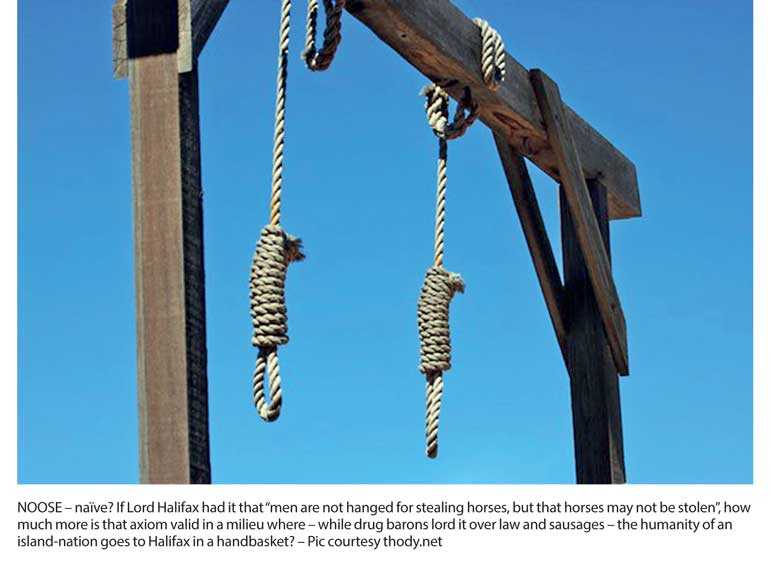Friday Feb 27, 2026
Friday Feb 27, 2026
Friday, 20 July 2018 00:00 - - {{hitsCtrl.values.hits}}

 It was the best of times, it was the worst of times; it was the age of wisdom, it was the age of foolishness; it was the epoch of belief, it was the epoch of incredulity; it was the season of light, it was the season of darkness; it was the spring of hope, it was the winter of despair. We had everything before us, we had nothing before us; we were all going direct to heaven, we were all going direct to hell… Or – as the author had it – “the other place”.
It was the best of times, it was the worst of times; it was the age of wisdom, it was the age of foolishness; it was the epoch of belief, it was the epoch of incredulity; it was the season of light, it was the season of darkness; it was the spring of hope, it was the winter of despair. We had everything before us, we had nothing before us; we were all going direct to heaven, we were all going direct to hell… Or – as the author had it – “the other place”.
Of course, Charles Dickens was writing these lines about the French Revolution. Which some of us – especially republicans or football fans – had double reason to celebrate recently. A remembrance of that bloody but blissful dawn in 1789 and a world cup victory 229 years later. But once the halcyon days of crying Liberté! Egalité! Fraternité! Mbappé! are over – and they will surely be over, as time passes and mundane matters return us to the real world – there may be little to celebrate.
In France, Dickens’s England (now Brexit-embroiled), or a little island republic where republican virtues are experiencing a hiatus. I suspect that if pressed, many citizens presented with a choice of nominating the dominant mood from the couplets above – ‘the best of times, the worst of times; everything before us, nothing before us’ – would reluctantly admit that the latter reigns today.
The compromised citadel of politics
It is the best of times in that the war is over but it is the worst of times in that the lessons of our protracted conflict seem to be so readily forgotten.
In the north, ministers of state may have felt that they could fly in the face of a hard-won peace and issue a clarion call for the return of an oppressive antidemocratic regime like the LTTE because the centre has not delivered. While that exercise in futility has been nipped in the bud with alacrity by the centre, the centre itself is showing signs of being unable to hold against the mere anarchy that the criminals of the past it failed to put away are letting loose upon the world. Where is the comparable kerfuffle when the southern business politics religion nexus calls for a return to our rulers under erstwhile state terror?
For in the south, the forces of a conservative government joined at the hip to a moderate minority formal opposition are steadily – and dare I say it, stealthily – crafting constitutional reforms that are bound to be a powder keg when the gravamen thereof is finally disclosed. That it might seem the highest treason – to do the right thing for the wrong reason – to the cohort of ultranationalism on which the former regime leans in hope of a resurrection speaks only slightly less well of the latter.
There is such a thing as the secrecy and expedience of being a majority partner in a creaking coalition, which bodes democratic-republicanism ill. Bliss it was that dawn to be alive; to be young was very heaven – three and a half years ago. Today, the regime has been ousted but the revolution appears to have died a natural death (if ever it was alive, and more than a dream?).
R&R
Ranil seems content to let the Rajapaksa machine run riot among the pigeons in civil society, who are squawking in fear or clucking in self-serving approbation; to let the President run amok to his own detriment, making the Premier’s laissez-faire approach shine in comparison; and to let the TNA run the transitional justice agenda on a parallel track with the UNP’s vision for rehabilitating the state of the nation. Two out of three is what passes for a graduating grade, is it?
We might seem presumptuous in attempting to plumb the mindset of our ‘Princes’. But when they prove as obstinately Machiavellian about their own party’s success at planning (to say nothing of its succession planning), one might be forgiven for assuming that the Premier would rather see an allegedly criminal cabal compromise his would-be political archrival cum present partner’s prospects at a forthcoming presidential election by dint of fielding a bête noire – rather than deliver on the campaign trail promises the UNP-led coalition made…
Made in China CIF
It is, however, the age of wisdom in that enlightened policies have replaced self-serving diktats. For it is rapidly becoming an age of foolishness in which democracy is being made tantamount to neoliberal economics dominating marketplace as much as national development policy. This with no thought for social justice among marginalised demographics or the future generations who do not belong to a class and capital elite, whose greatest grouse is still wasted man-hours while stuck in city traffic or the absence of a decent superhighway to the Central Province.
In the meantime, there are other fish to fry. If Mahinda’s ostensible cravenness in allegedly receiving China’s succour is to be investigated, let the covetousness of other campaign financing also be exposed. It never ceases to amaze me how the governing party’s propaganda manages to snatch defeat from the jaws of victory – the central bank bond scam being but a prime example, but not the only case in point.
It was the season of light: in which we thought the dark deeds of the immediate past would be arrested, brought to book, and put away for good where the sun doesn’t shine. But it has turned out to be a season of brief enlightenment before an impending darkness as the erstwhile forces of authoritarianism threaten to rise again and the shadow of antidemocratic usurpation lies across the near future of the land. It was the spring of hope in which the reformist agenda would restore the once hallowed norms of democracy and dissent. But is it not a winter of despair in which we find ourselves unable to both critique as well as commend Good Governance? We don’t damn with faint praise. Be grateful if a bit mystified!
If GG 0, then RR -10
This does not mean that we in any wise commend the political culture of violence with impunity that once prevailed. But that we rue the abject apathy into which our governors appear to have fallen. One incisive commentator on the state of the nation has characterised Sri Lanka as being confronted by a Hobson’s choice: clowns or demons? That too many of us are tempted to plead, “Send in the clowns! Rather they than the known devil” is to deny the fact that if only the angels were as organised as the legion of evil, we’d be only too ready to support them…
The fragile fortress of religion
And so on to the second subject that polite society deems is an inappropriate conversation topic in mixed company: religion.
It is the epoch of belief in which prelates still hold sway over the public psyche to the extent of invoking the spectre of the necessity for a Hitler to right the republic’s wrongs – and be taken seriously. It is the aeon of incredulity in which dismayed citizens watch silently as a police officer doing his duty as he sees it forfeits his life at the hands of a killer-strangler monk… and even fewer voices than protested at the slaughter of a leopard in the northern wilds are raised against the southern priest at the heart of a civilised and peaceful philosophy. It is the age of corrupt faith, a time when the ordained are inordinately profane, and no one minds much less feels it matters that monks as much as members of the public are equal or the same before the law of the land.
We had everything before us, and so we make the Cardinal mistake of endorsing a dispassionate presidential desire to sign off on the death penalty. We had nothing before us, and some of us say we are against it – not because we follow the compassionate Carpenter more closely or are concerned about Sri Lanka’s promises as regards the death penalty to the rest of the planet, but because we don’t want to seem naïve or outré.
We were all going direct to heaven, once upon a time. But now, caught between two hypocrisies, it seems we are already in some lower circle of hell. For between the battlements of politics and religion, the average citizen yo-yos between heaven-gate and hell-gate. Gut feeling alone lends gravitas to the executive signoff against drug dealers. And the liberals’ facile arguments that empirically there is no proof capital punishment stymies dastardly crimes seems an inconvenient truth. One that we might do well to ignore given the parlous state of law and order!
On the other hand, what passes for good sense commingled with early religious indoctrination contends in the average human breast. What if the innocent are wrongly condemned to death? What if a sentence of life imprisonment could lead to genuine repentance? The legalist would point out that the mandate for murder is death – no matter whether the judgment has been commuted until now; meaning that we’re not as humane as we thought! There is also the egregious condition of state prisons to consider, and whether execution would not be more merciful in the painful long run!
In all of these, neither politics nor religion offer rock and refuge. The politicians are too soft on their peers who perpetuate the pernicious drug culture while minions would hang… and the religionists often too hard on both people and principle. So in the limit, the desire of a hard-line president to please those who would see political ambition being made of sterner stuff places the average Sri Lankan in a dilemma. The resolution to which will be a first step towards rescuing our island spirit from the moral turpitude into which it has fallen between the cracks of religion and politics.
Torn between two fickle swains, Lady Lanka must abandon its wooers and suitors in favour of a neo-secular state in which neither religious impiety nor political showmanship prevail over first principles. Not liberty or death, but liberty and life; and death to any murderers, rapists and drug barons ensconced snugly in cabinet ranks.
(Journalist | Editor-at-large of LMD | Writer #SpeakingTruthToPower)